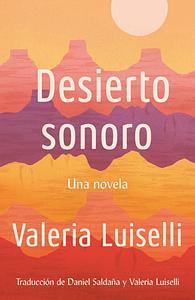Take a photo of a barcode or cover
A misguided mess. I only rated it this high because there were some moments of insight and clarity amidst the folly.
A timely book about migration - told through the story of a disintegrating family on a long road trip from NYC to Arizona. Two adults and two children, all unnamed - just boy, girl, husband, wife; a gaining-in-popularity conceit that annoys the hell out of me. The parents are activists - she for the child migration crisis at the border, he for the history of genocide of Native Americans. Somehow, both of those issues are equated with the impending divorce and break-up of this family and delineated through an overly indulgent, look-at-my-MFA highly stylized storyline featuring lists of the contents of archive boxes, Polaroids, and a 20-page single sentence near the end. All that and two of the most unbelievable, philosophical, mystical children ever written. Obviously not for me.
A timely book about migration - told through the story of a disintegrating family on a long road trip from NYC to Arizona. Two adults and two children, all unnamed - just boy, girl, husband, wife; a gaining-in-popularity conceit that annoys the hell out of me. The parents are activists - she for the child migration crisis at the border, he for the history of genocide of Native Americans. Somehow, both of those issues are equated with the impending divorce and break-up of this family and delineated through an overly indulgent, look-at-my-MFA highly stylized storyline featuring lists of the contents of archive boxes, Polaroids, and a 20-page single sentence near the end. All that and two of the most unbelievable, philosophical, mystical children ever written. Obviously not for me.
Lost Children Archive is a page turner! I borrowed this book from the library, but I think will be purchasing a copy of the book too (yes, I loved it that much). I loved how Luiselli switched perspectives so flawlessly, from mother to child. Towards the end of the book, I was holding my breath, hoping that it would turn out all right in the end.
reflective
medium-paced
Plot or Character Driven:
A mix
Strong character development:
Yes
Loveable characters:
Complicated
Diverse cast of characters:
Yes
Flaws of characters a main focus:
Complicated
I loveeeeed this book! It’s written so beautifully with different voices throughout. Never read anything like it before. It’s so real and relatable!
dark
informative
reflective
adventurous
challenging
dark
emotional
informative
reflective
sad
tense
slow-paced
Plot or Character Driven:
Character
Strong character development:
Yes
Loveable characters:
Complicated
Diverse cast of characters:
Yes
Flaws of characters a main focus:
Yes
Such a powerful book, I'm going to need a minute to recover from this.
First of all, it felt like reading two books. Not necessarily due to first-person switch half-way, but due to style. Nearing the end, Luiselli creates a feeling of suspense and tension leading towards the meeting of "the kids" and "the lost children" by letting their thoughts, feelings and surroundings intertwine with nothing but comma's to shorten sentences. This created a sense of urgency leading to the inevitable climax of the children meeting. By switching to this style, it felt like a whole new book.
Something else that made the divide interesting to me, is the reality vs. fantasy switch. In the beginning, the reality is the failing relationship, with the lost children as a far away thought and using make believe to substitute historical stories. When the first person view switches, the grip on the reality of the failing relationship is loosened, and exchanged with make believe, bringing the reality of the Lost Children much closer, and even too close fo comfort.
Looking back at the first part, I remember being pleasantly surprised at the mundane descriptions Luiselli provides of the familiy's life; the secretive, the weird, the mundane - described to the extent it becomes recognizable.
Lastly, I believe this book is a beautifully written acknowledgement (to say the least) of the crisis at the Southern border of the US. Maybe not a call to arms, but a respectful what the fuck - respecful to those who try to find freedom and safety in the US, the what the fuck to the way we treat them.
First of all, it felt like reading two books. Not necessarily due to first-person switch half-way, but due to style. Nearing the end, Luiselli creates a feeling of suspense and tension leading towards the meeting of "the kids" and "the lost children" by letting their thoughts, feelings and surroundings intertwine with nothing but comma's to shorten sentences. This created a sense of urgency leading to the inevitable climax of the children meeting. By switching to this style, it felt like a whole new book.
Something else that made the divide interesting to me, is the reality vs. fantasy switch. In the beginning, the reality is the failing relationship, with the lost children as a far away thought and using make believe to substitute historical stories. When the first person view switches, the grip on the reality of the failing relationship is loosened, and exchanged with make believe, bringing the reality of the Lost Children much closer, and even too close fo comfort.
Looking back at the first part, I remember being pleasantly surprised at the mundane descriptions Luiselli provides of the familiy's life; the secretive, the weird, the mundane - described to the extent it becomes recognizable.
Lastly, I believe this book is a beautifully written acknowledgement (to say the least) of the crisis at the Southern border of the US. Maybe not a call to arms, but a respectful what the fuck - respecful to those who try to find freedom and safety in the US, the what the fuck to the way we treat them.
adventurous
emotional
funny
informative
inspiring
reflective
sad
tense
medium-paced
Plot or Character Driven:
A mix
Strong character development:
Yes
Loveable characters:
Yes
Diverse cast of characters:
Yes
Flaws of characters a main focus:
Complicated
adventurous
challenging
reflective
tense
medium-paced
Plot or Character Driven:
A mix
Strong character development:
Yes
Loveable characters:
Yes
Diverse cast of characters:
Yes
Flaws of characters a main focus:
Yes
At times, very big brain energy. Like it makes you think and then makes your head hurt a bit and so because of that, the reading experience was challenging at times. It does have really poignant reflections though. I agree with Josh's description: you read something and then think you have a point to make and then the book makes that point a few pages later, which can have either the effect of making you feel really smart for anticipating it, or the opposite because you realise your interpretations aren't that original. There's a line about reading and how it gives words to something that you, up until you read it, didn't realise you didn't have words for. I liked that. I thought it was smart and exactly how I feel reading in general but also as I read this book, so pretty meta. The breaks in form are also clever, though sometimes I feel like I don't entirely get everything she's trying to convey through them because she explicitly says there's a point to them but I can't be bothered to think that hard.
Zaskoczyło mnie to jak świetnie się czytało ten tytuł, pomimo wymagającej (w mojej ocenie) treści i formy. Nie powiem Wam czy to książka bardziej o rozpadzie rodziny czy o dzieciach-uchodźcach (lub szerzej „kryzysie” migracyjnym i humanitarnym), albo o tym, jak gubimy się w naszej teoretycznie poukładanej i skatalogowanej rzeczywistości. Dla każdego będzie czymś innym. Zaskakująca w formie - najpierw przypomina reportaż, potem przechodzi w bardziej poetyckie tony, sama fabuła staje się też mniej realistyczna. Dodatkowo pojawia się powieść w powieści, zmienna narracja, mnóstwo nawiązań literackich, muzycznych i zdanie na kilkadziesiąt stron. A po przeczytaniu słów autorki na końcu książki, chciałabym zacząć ją czytać od nowa, by wyłowić z niej zupełnie nowe rzeczy. Dla mnie to Wielka Literatura. Amen.
emotional
informative
tense
slow-paced
Plot or Character Driven:
Character
Strong character development:
No
Loveable characters:
Complicated
Diverse cast of characters:
N/A




